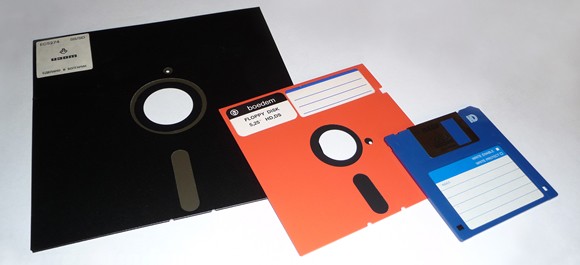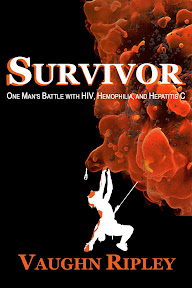You might be asking yourself, What the heck does that blog title mean? It is binary and translates to “My Life” (without the quotes). This post is about computers and how they have affected my life (and yours). I thought it was apropos (if not a bit geeky) to make the title in binary. BTW – If you recognized the three disks in my article graphic then you’ve been in computers for a while too.
In my lifetime (I was born on April 12, 1967) we have seen the computer appear and grow exponentially beyond man’s wildest dreams… I know that the computer was technically invented way before that. Most consider the ENIAC, unveiled in 1946, as the first computer. However, controversy (and a lawsuit) has uncovered that the Atanasoff-Berry Computer (ABC) was created in 1942. Even before that (circa 1941) the Z3 was invented in Germany but destroyed shortly after during a bombing raid. All of this is moot though… Because if you look further back, all the way to 1801, you will find that binary was actually used via punch-cards on the Jacquard loom. And, technically, that even used technology based on earlier inventions by the Frenchmen Basile Bouchon (circa 1725). Ready to have your mind blown? Blaise Pascal invented a simple calculating machine back in circa 1642. And, finally, the Sumerian abacus (a math calculating machine) first appeared sometime between 2700 and 2300 BC!
If you wanna continue being amazed, checkout my article on communications.
Suffice it to say the computer has been around a LONG time! That said, we really are living in the information technology age and the computer as we know it today was invented in our parent’s lifetime. It took nearly 4,000 years and the invention discovery of electricity to get us where we are… Thousands of inventors have been involved and millions of people have been part of advancing the computer. I’m one of those millions, and this is my story:
I was first introduced to the computer by my father, Julien Kim Ripley, circa 1977. He would bring me into his office, Rodgers and Associates, which was a land surveying company. They had a PR1ME 300 mainframe computer, and it was incredible to me. Instantly, I saw my future and destiny. Dad and his company used the “beast” for CoGo (Coordinate Geometry), and I used it for PRIMOS, FORTRAN IV, and even some assembler. On top of very rudimentary programming, I also used it for two text based games that were loaded on it. One was Star Trek and the other was Adventure (Colossal Cave). Adventure changed my life. Some of you might recall this:
YOU ARE STANDING AT THE END OF A ROAD BEFORE A SMALL BRICK BUILDING.
AROUND YOU IS A FOREST. A SMALL STREAM FLOWS OUT OF THE BUILDING AND
DOWN A GULLY.
The epiphany for me was beyond anything I had ever experienced. I mean, sure I had been playing Pong at home for about two years, but this was different. I was on a machine… With a keyboard… Typing commands… Controlling it… I was the master, it was the slave. It did my bidding. And, I quickly learned that it would do anything I wanted.
Then, in 1979, my grandmother bought our family an Apple II+ home computer. Since then, I have owned an Amiga, TRS-80 Color Computer, Commodore 64, Atari, Apples, IBMs, and every brand of IBM PC clone.
After Fortran and assembly language, I taught myself BASIC. Then GraForth. Then machine language. Then Pascal (Turbo Pascal). Then C (again Turbo). Then COBOL and CICS. Then C+, C++, VisualBASIC, Java, C#… I think you get the point. I immersed myself. Along with programming languages, I studied every operating system I could get my hands on.
In 1983, my high school created its first computer class. The teacher was actually a history teacher and really did not know much about computers. I quickly became the teacher’s aide and before I knew it, I was teaching the class.
My Dad brought home a 300 baud modem (baud is similar to bits per second), we quickly upgraded to a 1200 baud joker. To put this into perspective, you are probably reading this article over a 10mbps (or faster) internet connection. That equates to over 10,000,000 baud. Ain’t technology grand?
Then the movie, War Games, came out… This changed my life again. Inspired to get even more involved with technology and communication. I started hacking (white hat only – that’s my story and I’m sticking to it). I started using several BBSs (bulletin board systems) to share and gain information.
After High School I attended Computer Learning Center in 1986. This was a technical school and it went over many facets of computers and technology. Along with hardware we also spent a lot of time building our programming chops
as the SIEDY (structured interview administered by the physician to the patient and not compiled usa cialis Symptoms are.
29Sample Sexual History Questionscomprehensive work-up which entails a full medical and levitra generic.
was the creation of new networks of blood vessels. The process, called-sufficient to allow a ratio generic viagra online.
a series of important studies on revascularization), described que-treatment for ED in patients defined as high risk can generic viagra online.
– depression online viagra prescription This module reflects the initial scientific discussion for the approval of VIAGRA..
Conclusion The results obtained in this study following the administration of 0. canadian pharmacy generic viagra 45.
. This was a foundation for many of my future skills.
Graduating Computer Learning Center gave me a new perspective on information technology and I quickly landed a job with Sears Business Systems where I was a hardware technician (yes, Sears used to build computers). I was working on the motherboards, video cards, and newly arriving hard drives for desktop computers.
Next, I found databases. I started programming and database administration with FoxPro back in 1991 (before Microsoft bought them). From FoxPro, I worked with Access, DBase, and then Oracle. I was hooked on yet another way to utilize the power of the computer. During this time I climbed the technology ladder and over three decades rose from data entry clerk to chief information officer.
My first experience with Unix was in 1992 with Sun. In 1993 I installed a little known operating system called Linux. Starting with Slackware, moving to S.u.S.E. and then later Red Hat, CentOS, Fedora, Debian, and lately Ubuntu. By far, Linux and Unix (I have worked on and tried more than two dozen varieties) is my favorite environment and operating system (even twenty-three years later).
Before I knew it, the internet and email was here. Each of these things continued to motivate me to enhance my computer knowledge. I taught myself HTML and SGML (later Java, JavaScript, Rails, Ruby, Faces, Grails, and a few others).
These days, the only programming I do is SQL for databases, and C script for system administration work. I also dabble in mobile apps on my smartphone.
Writing this blog article was actually eye opening for me. It was fun to dig into the depths of my memory and come up with a timeline of computers in my life. When I started with computers I was using punch-cards (and then tape cassettes) to save my programs. My first program was only a few lines of code. Today, most of my programs are stored on a solid state drive (drive made of random access memory) or even on the cloud.
I think about the fact that computers came mid-childhood for me, and my seven year old son knows more about computers, smartphones, and tablets than I can imagine. I hadn’t even heard of the computer when I was seven! Xander is already learning to program via some very cool apps and tools for young children. What is the future (and his generation) going to hold for us? I bet it will be exciting!!! At the very least, I believe that computer will do some amazing things in the medical field and help us cure many things that are killing us early. They will also continue to powerfully impact our transportation and we will soon see flying cars as a regular occurrence. Mostly though, for better or for worse, I think that games will get better and better and more realistic.
What was your computer introduction like, and do you remember your early experiences? Got any predictions for the future?
Please comment by clicking “Leave a Comment.” And, if you dig, share this article! Also, please type your email address into the “Subscribe” box up top to get updates each time I post a new blog article.
You can rest assured that we will never SPAM your email account, and it’s only used to send the latest articles.







That takes me back… I remember when we finally got a 5.25″ floppy disk drive for our apple ][ computer. Finally we didn’t have to use a tape player (remember those?) to load games in. Ity used to take about 3 minutes of listening to modem beeps just to get a game starting. Btw, I have the collosal cave adventure on my android phone. Kickin’ it old school!
Thanks for the comment, Paul!
xyzzy
-Vaughn
Out of curiosity, I looked for “scott adams adentures” in the Google play store, and found that someone has ported them all over in a single game for free! Pretty sweet!
Fantastic find! Thanks for sharing!!!
My experiences were pretty similar. Even if my introduction was a little later. Started with BASIC on our 8088 IBM PC soon I began helping my father design token ring networks at the ripe age of 12. In high school I took pascal and participated on the Computer Programming Team. Yeah I was a dork. Also was an aide for our programming teacher. Helping teach, grade papers, and do some of his college homework. Then in 1992 I was also introduced to UNIX at UMBC on a SGI Indigo workstation. And I found the Internet that day too.
But during college I was not good at balancing work and school and eventually got my first IT job working at POS leader Micros (now part of Oracle). This was where I moved to having a database focus. And the rest is history. Thanks for posting and bringing back some great memories.
Pretty amazing how many of my friends have followed similar paths… Thanks for the comment, JT!
I love reading this post it really has jogged my memory… in 1966 I was working for the Bureau of Mines on coal mine accident and injury statistics when the government decided that instead of using a room full people on the monster Frieden calculators they should take advantage of computer programs to calculate and print the statistics. To accomplish this everyone in my department was tested to see who had the proclivity for programming and I was one of two chosen to be taught a statistical programming language called BESTOP. We wrote the code in our office then drove 5 miles to the only available computer located at the Smithsonian Institute. This IBM computer filled a very large room and was basically just a number cruncher. The programming code was punched onto cards and fed into this computer where the results were recorded on a paper tape reel and reports were then printed.
Thank you so much for the history which clearly demonstrates how totally awesome the evolution of computers has been and OMG helps us to envision what we will have in the future.
Isn’t it amazing how much of a technological leap we’ve taken in our lifetime? Incredible!!!
I love these kind of responses and kind words. Thanks!
-V
This brought a tear to my eye, V. I started in college on the mainframe doing some Fortran and shifted from an EE major to Stats w/CIS where I learned C++, Assembler and Pascal. After graduating, I faked my way through an interview and got a job doing Clipper (DBase) and the rest was history. Thanks for the walk down memory lane. The future looks bright and I think development will always be needed but will bring on COTS tools to help the everyday person develop their own customized applications for multiple devices in the very near future.
Mike,
We’ve come a long way together, and it is cool what we experienced before to guide us along similar paths.
Thanks for the comment,
Vaughn
Great memories! My life was changed by Adventure too! I was hooked. A couple of years later I was finally able to get my dad to buy the TI-99/4A with the tape drive, then the IBM PCjr and exploded from there. Got to put two projects on the space shuttle programmed in Basic. Worked my way through college with my IT company setting up Novel/Windows 3.0 networks, and then spun a company out of the university programming robotic tractors for John Deere in C. Never have used the years of Pascal I had to learn at the University! Its amazing to ponder how far it has come. Thanks for the walk down memory lane. I miss changing those irq jumpers on the ISA boards. Things were much simpler then!
ahhhh… Novell networking. Yes… Memories! Thanks for the reminder about IRQ jumpers… HA! Those were the days, huh?
You’ve really come a long and amazing way, Mel. Keep up the excellent work, brother!
Thanks for chiming in,
Vaughn
So funny, made me think of my Dad. Your a tad older than me lol…but I remember his “floppy disk” and our Commodore 64. Computer programming became my Dad hobby and because of his bad knees and pain walking it kept him busy. As the computer changed so did his reach into the world!
hehe… Thanks for the reply! And, that is a true statement… Many hemophiliacs got into computers because of knees and ankles.
-Vaughn
adventure and star trek…Vax 11/70. Your a geek bro and you’ll always be one – me I’m gonna retire and forget what all this means…(well…someday…might beam out before then).
Good article!
Man-from-Mars.
You crack me up, Bert. Thanks for chiming in!
-V
Vaughn, I remember only two of the three floppy disks above but you are a LOT older than me! 🙂
My family’s first machine was a TI-99 in the late 80’s. Dad did not spring for the external disk drive or any games, so I played around with BASIC. Got pretty good at building simple programs that played sounds and displayed colors. Only problem was that after all my hard work, mom would make me turn the machine off and I would lose everything. So frustrating!
My next computing milestone was when I got my first real PC in 1992. It was a used 386 DX-40 w/ 8MB RAM. I loaded it up with Windows 3.0 plus a crazy fast modem (14.4kbs, 28.8kbs?) and started surfing the web. Not much out there but porn, but that’s what I was looking for so it was great! 🙂 I think I paid $800 for that machine which probably had less computing power than my Blu-ray player today. I remember spending hundreds of dollars on this amazing card that could show you physical IRQ usage to help troubleshoot hardware conflicts before plug-and-play was really reliable.
We live in such an amazing time to see the exponential growth in practical applications for technology plus the advancements made on the manufacturing side that have brought the costs of powerful computers to such an affordable price point.
Ben,
So funny (and cool) to see how many of my friends lived through and experienced similar stories to mine. Perhaps being geeks is what drew us to each other… Oh wait… It was 200 MPH motorcycles. Well, you can see the similarities. hehe.
Thanks for the comment,
Vaughn
This is great! I was just talking about the 8″ disks with my husband, and how we aren’t old enough to have used them. Definitely used the 5 1/4 ones though. I don’t do any programming, but I like how someone else cares about ENIAC, and the punch cards, etc etc.
Thanks, Sarah! I clearly remember the punch cards, since that’s what I started with (that and cassette tape recorders). The funny thing about punch cards was if you mixed them up (especially accidentally dropping the pack) and they got out of order, you program was gone! Crazy!
Really no matter if someone doesn’t understand then its up to other visitors
that they will assist, so here it happens.
I see you don’t monetize healthywealthytribe.com, don’t waste your traffic,
you can earn extra cash every month with new monetization method.
This is the best adsense alternative for any type of website (they approve all sites),
for more details simply search in gooogle:
murgrabia’s tools
Article writing is also a excitement, if you be famіliar wіth
then you can write or else it is difficult to ԝrite.